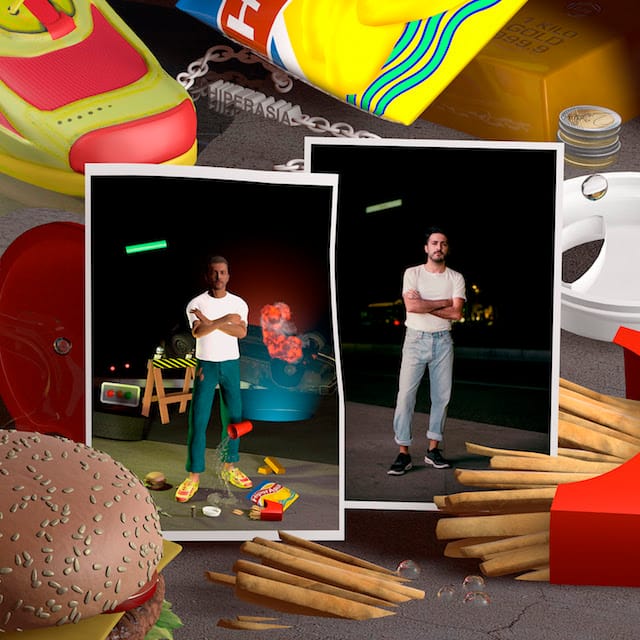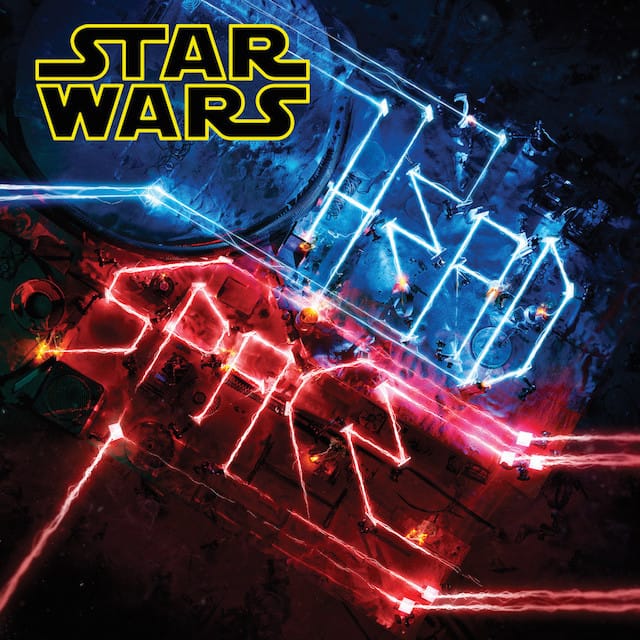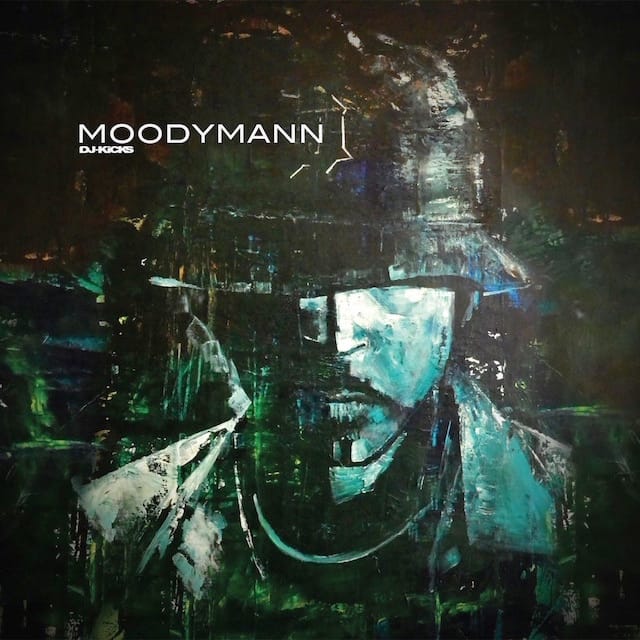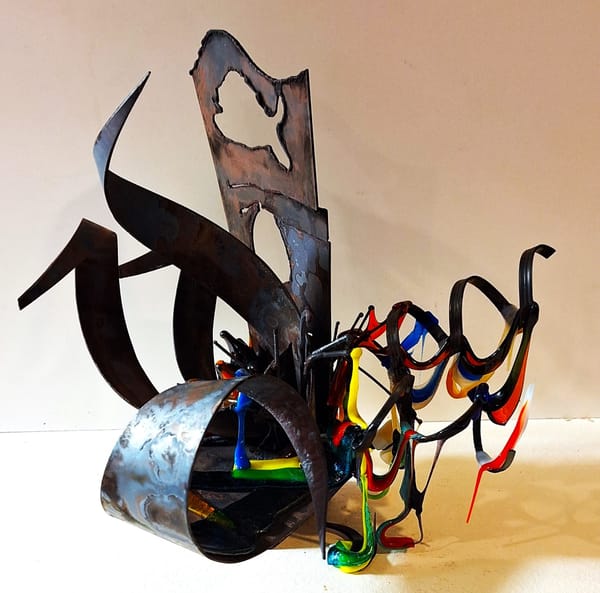Techno Mix: Madrid Plastic, Chicago Minimal, Intergalactic Maximal, and Detroit Analog
El Guincho's "Hiperasia," DJ Slugo's "Cocaine Music," "Star Wars Headspace," and Moodymann's "DJ Kicks."

El Guincho: Hiperasia (Nacional, 2016)
After a six-year hiatus, Spanish producer El Guincho returns with a concept album inspired by Hiper Asia, a chain of stores in Madrid selling cheap, trashy trinkets. While the source material might seem like a good fit for an artist this fascinated by bright colors and plastic surfaces, I suspect he took the challenge of translating trinkets into song far too literally.
More exclusively electronic and less instrumentally varied than his previous work, dominated by woozy waves of synthesizer and his own chirpy, pitch-corrected vocals, this music shares a style not just with the impractical shit sold in Hiper Asia but with a lot of avant-garde Spanish-language rock and/or electronica: it’s colorful, jumpy, fragmented, a little garish, and also pinched, narrow, perversely difficult. Where on 2008’s Alegranza simulated guitar riffs pealed beautifully through midair, Hiperasia’s thin, bleepy keyboards shift and slither over offbeat drum machines; where assembled rooms of people once shouted gleefully in unison, El Guincho now mumbles Melodyne-garbled melodies in a twisted harmonic logic that frequently proves more puzzling than catchy. If this music had a harder edge — harsher textures, say, or a memorable set of minor-key tunes — its knotty weirdness might prove mesmerizing, as indeed it does on “Pelo Rapado,” with its synth chomp, and “De Bugas,” with its synth sputter. Sacrificing the joy of Alegranza for the mannerisms of a quirky art-rock style that never seems fully comfortable with itself, there’s something slightly queasy about the album as a whole.
Vivid, intense, distinctive, the album nevertheless fails to cohere. Perhaps El Guincho is secretly more cynical about the value of useless plastic doohickeys than his tribute implies. Perhaps the aesthetic behind said doohickeys proves more compelling as a visual palette than a musical one.
DJ Slugo: Cocaine Music (Blok Club DJs, 2016)

Having previously crowned himself the “King of Ghetto House,” prolific Chicago house/footwork fixture DJ Slugo proves his right to the title with this razor-sharp EP. Slighter and harsher than competing offerings by Jlin and DJ Rashad, it generates furious momentum.
Take the title literally. This is cocaine music not thematically but aesthetically, hooked on a frantic, jittery energy that can’t stop fidgeting or jumping up and down or tripping over itself only when it isn’t doing sprints back and forth. Nonstop metallic 808 beats slam crunch slam crunch bounce bounce as simple, repetitive vocal samples echo and build and twist and repeat and repeat until the whole thing is airborne, zooming around with grace and acutely focused intensity. While every now and then a keyboard slides into the mix, the drums dominate; obsessively rhythmic to the exclusion of melody, this music leaves your head buzzing with nothing to hum. Verbal content typically concerns the dancefloor and things to do there, specifically such commonly overheard phrases as “pump it” and “pump it down” and “work that body” and “girl what you want” and “break me on the floor” and “uhh” and “ahh” and “ugg.” But Slugo’s true message resides in the clicks and clacks of the percussion.
Music this stripped-down usually winds up too abstract; this jumping bean of a record more closely resembles a joke about abstraction, and content, and functionality. Just because it’s so spare, it’s also aerodynamic, and frequently reaches lightspeed. Minimalism lives!
Star Wars Headspace (Hollywood, 2016)

While at first glance this album appears an empty promotional device for Star Wars: The Force Awakens, in fact it’s an irresistible slice of maximalist technokitsch orchestrated by Rick Rubin, who recruited several leading EDM artistes, gave them a file filled with assorted samples from the Star Wars movies, and let them go to town. Behold, one of those albums whose sheer concept is almost as glorious as the music itself.
Majestic and moving though it may be, John Williams’s original score makes zero appearances here, per Lucasfilm’s instructions. Instead, Flying Lotus, Baauer, Galantis, and the rest foreground snippets of dialogue and unmistakable sound effects: lightsabers buzzing, blasters firing, droids squealing, Chewbacca wailing, Han Solo snarking (“I got a baaaaad feeling about this”), C-3PO bitching (“don’t get technical with me!”), and, of course, the endless chatter of R2-D2, all over a reliable assortment of shiny, throbbing electrobeats. Röyksopp’s “Bounty Hunters” keeps returning to Greedo snarling “Oota goota Solo?” as the keyboard sirens pound and shimmer. Several songs use Darth Vader’s breathing as a rhythmic element — most spectacularly GTA’s “Help Me!” — which also incorporates dialogue from Princess Leia. One worries that the album might perhaps fail to grab those unfamiliar with Star Wars, but that misses the whole point, which is that the various electronic noises bleeping and burbling throughout the movies generate a musicality of their own. Anyway, the songs with fewer identifiable samples fit right in, and these expert producers have crafted whopping dance hooks any clubgoer would love — dance hooks whose big, brash, theatrical sense of emotion has a lot in common with Star Wars, in fact, and whose sweeping, surging grandeur suits these sound effects exactly.
Fanboys for whom the franchise carries the weight of serious epic will find the album sacrilegious. Those of us who think it’s all a bunch of camp and love it for precisely that reason will treasure the album as a metacelebration.
DJ Kicks: Moodymann (!K7, 2016)

Detroit techno legend Moodymann has been consistently releasing music since the late ‘90s, and like all mastermixers he covers a wide range; however, his core style aligns him with a steady Detroit tradition of sampling/simulating old soul music and placing it within a modern electronic context. On DJ Kicks, a long-running series of DJ mix albums (other contributors include Hot Chip, Chromeo, et al.), he remixes a bunch of his favorite songs by other artists in the same tradition for a unified exercise in neodance deconstruction.
Genre juxtaposition to the contrary, the key dichotomy at the heart of this music isn’t between soul and techno, or authentic and superficial, or even old and new. It’s about the audible difference between analog and digital sound. Dry, aching voices, crude horn honk, noodling jazz guitar, quietly crackling flickers of static, all this gets played against clean electronic surfaces and squiggly synthesizers to shape a sonic disparity that also serves to contextualize both sides — the soul/jazz material sounds old and weird partially because hearing it during a speedy dance mix creates the illusion of discovery, as if Moodymann were sorting through piles in the back of a record store, playing Big Muff’s “My Funny Valentine” cover for the first time, and falling in love with the glittering keyboards and liquid bassline. One problem is that the mix rushes through each track too quickly, leaving only the wackiest selections to linger in the memory; another is the preponderance of those flute solos that became a hallmark of ‘70s black music only in retrospect, when crate-diggers started listening to blaxploitation movie soundtracks. Remain on your feet for the album’s duration and you may not notice.
The album’s definitely too long, and it’s only a DJ mix, but anybody looking for unconventional stuff to dance to will be grateful for Moodymann’s warmth and warped perspective. Play it at parties alongside Flying Lotus’s You’re Dead! and Kid Koala’s 12 Bit Blues.





